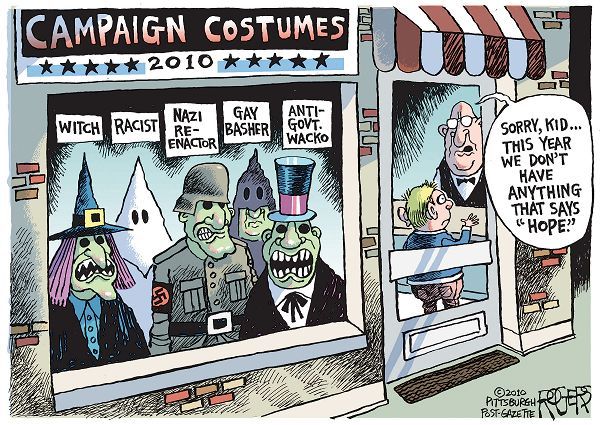Monday Business Edition
Nobel Prize winning economist Paul Krugman quotes with approval a comment from this post on Irish austerity-
Most people don’t realize that “the markets” are in reality 22-27 year old business school graduates, furiously concocting chaotic trading strategies on excel sheets and reporting to bosses perhaps 5 years senior to them. In addition, they generally possess the mentality and probably intelligence of junior cycle secondary school students. Without knowladge of these basic facts, nothing about the markets makes any sense- and with knowladge, everything does.
How the Banks Put the Economy Underwater
By YVES SMITH, The New York Times
Published: October 30, 2010
The banks and other players in the securitization industry now seem to be looking to Congress to snap its fingers to make the whole problem go away, preferably with a law that relieves them of liability for their bad behavior. But any such legislative fiat would bulldoze regions of state laws on real estate and trusts, not to mention the Uniform Commercial Code. A challenge on constitutional grounds would be inevitable.
Asking for Congress’s help would also require the banks to tacitly admit that they routinely broke their own contracts and made misrepresentations to investors in their Securities and Exchange Commission filings. Would Congress dare shield them from well-deserved litigation when the banks themselves use every minor customer deviation from incomprehensible contracts as an excuse to charge a fee?
…
The large banks, no doubt, would resist; they would be forced to write down the mortgage exposures they carry on their books, which some banking experts contend would force them back into the Troubled Asset Relief Program. However, allowing significant principal modifications would stem the flood of foreclosures and reduce uncertainty about the housing market and mortgage securities, giving the authorities time to devise approaches to the messy problems of clouded titles and faulty loan conveyance.
The people who so carefully designed the mortgage securitization process unwittingly devised a costly trap for people who ran roughshod over their handiwork. The trap has closed – and unless the mortgage finance industry agrees to a sensible way out of it, the entire economy will be the victim.
(Nobel Prize Winning) Economist Stiglitz: We need stimulus, not quantitative easing
By Ezra Klein, Washington Post Staff Writer
Saturday, October 30, 2010; 9:07 PM
The Fed, and the Fed’s advocates, are falling into the same trap that led us into the crisis in the first place. Their view is that the major lever for economic policy is the interest rate and if we just get it right, we can steer this. That didn’t work. It forgot about financial fragility and how the banking system operates. They’re thinking the interest rate is a dial you can set and by setting that dial, you can regulate the economy. In fact, it operates primarily through the banking system, and the banking system is not functioning well. All the literature about how monetary policy operates in normal times is pretty irrelevant to this situation.
…
(T)he reason the private market for mortgages has dried up is that everybody knows the moment the government withdraws from the mortgage market, the effect will be that there will be a capital loss on the mortgages – and the same thing goes for our long-term bonds. Now we don’t use mark-to-market accounting, so we’ll pretend they don’t occur, but they will have occurred. We’ll have experienced a loss. The third point is that to avoid recognizing the loss, the Fed is likely to do silly things, like rather than buying and selling government bonds, they’ll pay interest on deposits banks make to the Federal Reserve in order to absorb the liquidity.
There are two problems with this. First, it’s costly, as we’re now paying interest when we didn’t before. Second, we don’t know how well this will work. And because it’s uncertain, you might say that the financial markets, recognizing we’re going into uncharted territory, will request a risk premium. That’ll hurt the U.S. Treasury and would be bad for the economy. So this is not costless. If it were the only instrument, you might say we have no choice. But it’s not. Fiscal policy is a choice, or it should be a choice. By putting fiscal policy off the table, we’re moving down the cost-benefit curve to something much riskier and much less cost-effective.
Mugged by the Moralizers
By PAUL KRUGMAN, The New York Times
Published: October 31, 2010
So what should we be doing? First, governments should be spending while the private sector won’t, so that debtors can pay down their debts without perpetuating a global slump. Second, governments should be promoting widespread debt relief: reducing obligations to levels the debtors can handle is the fastest way to eliminate that debt overhang.
But the moralizers will have none of it. They denounce deficit spending, declaring that you can’t solve debt problems with more debt. They denounce debt relief, calling it a reward for the undeserving.
And if you point out that their arguments don’t add up, they fly into a rage. Try to explain that when debtors spend less, the economy will be depressed unless somebody else spends more, and they call you a socialist. Try to explain why mortgage relief is better for America than foreclosing on homes that must be sold at a huge loss, and they start ranting like Mr. Santelli. No question about it: the moralizers are filled with a passionate intensity.
And those who should know better lack all conviction.
John Boehner, the House minority leader, was widely mocked last year when he declared that “It’s time for government to tighten their belts” – in the face of depressed private spending, the government should spend more, not less. But since then President Obama has repeatedly used the same metaphor, promising to match private belt-tightening with public belt-tightening. Does he lack the courage to challenge popular misconceptions, or is this just intellectual laziness? Either way, if the president won’t defend the logic of his own policies, who will?
Business News below.


 Commencement speech at the New School University in New York on May 21, 2004
Commencement speech at the New School University in New York on May 21, 2004
Recent Comments